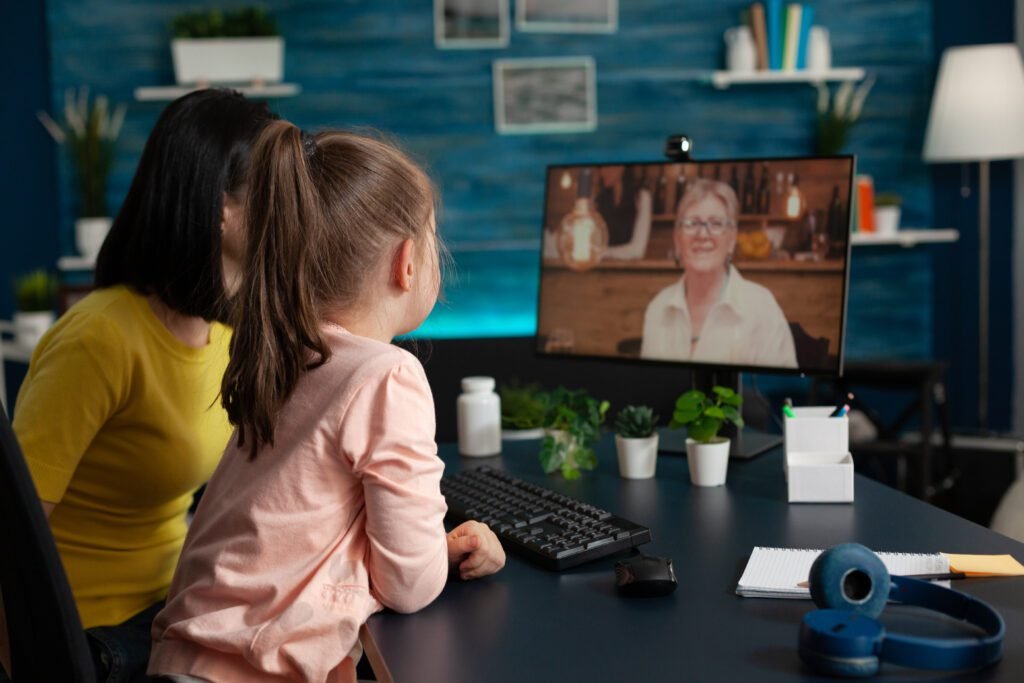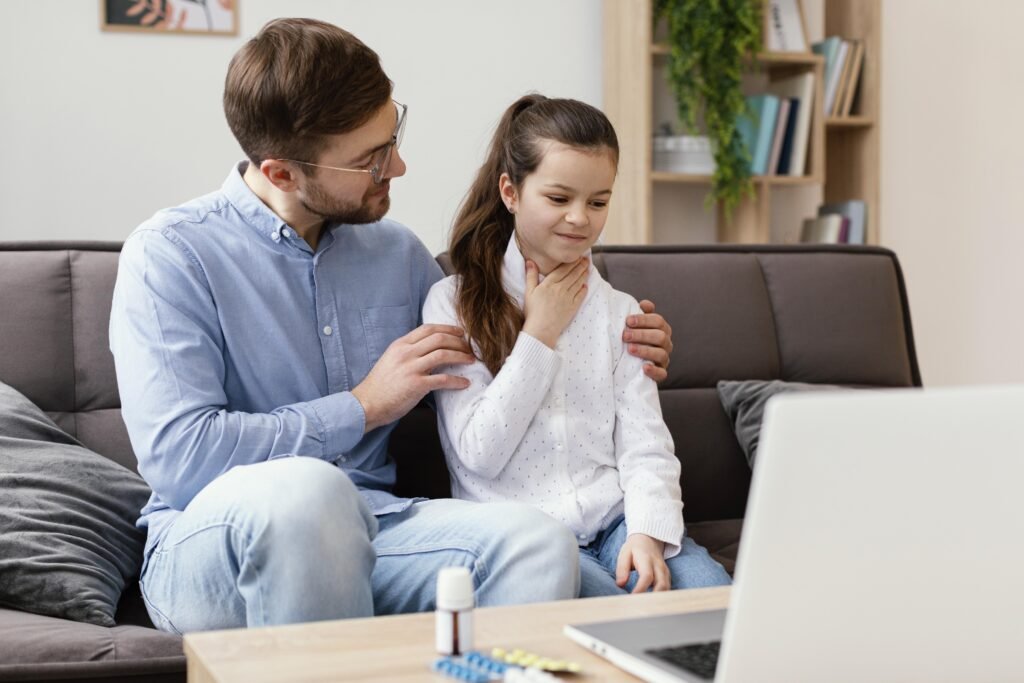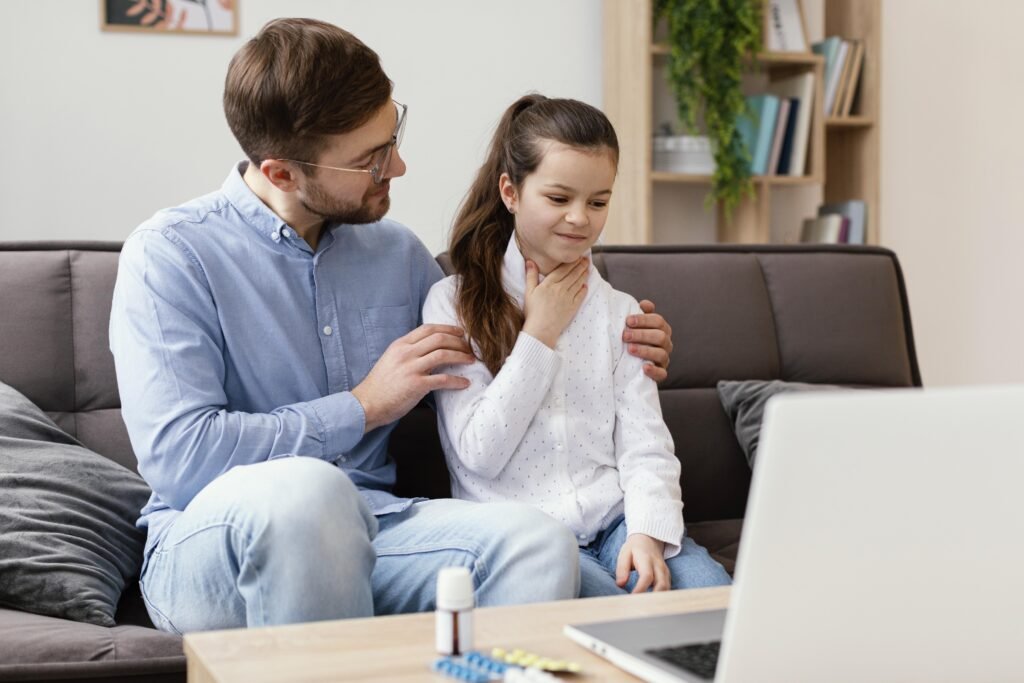Grieving is hard for anyone, but when a child loses a loved one, the process can feel overwhelming and confusing. Their understanding of death varies depending on age and development, and they often lack the language or emotional regulation skills to process what they’re feeling. At Amy Brown Counseling, we specialize in helping children ages 7 and up work through loss using compassionate, child cope, evidence-based support, including virtual therapy sessions that allow kids to receive help from the comfort and safety of their own space.
Drawing inspiration from renowned grief expert Dr. Alan Wolfelt, this post offers guidance for parents looking to support their child through grief, with virtual therapy as a key resource.
Understanding How Children Experience Grief
Grief in children often looks different from grief in adults. While adults may cry often or speak openly about their loss, children may fluctuate between moments of sadness and playful behavior. This is not avoidance—it’s developmentally appropriate. Children often “dose” their grief in short, manageable spurts.
Some common ways grief may appear in children include:
- Regressed behavior (thumb sucking, bedwetting, needing more reassurance)
- Difficulty concentrating
- Changes in appetite or sleep
- New fears or separation anxiety
- Anger or irritability
- Asking the same questions repeatedly about death or the deceased
Dr. Wolfelt describes the concept of “mourning” as the outward expression of grief. Children need safe ways to express and explore their grief through mourning—whether through play, storytelling, drawing, or talking. This is where virtual therapy can play an essential role.
Why Virtual Therapy Works for Grieving Children
At Amy Brown Counseling, we offer virtual therapy sessions for children ages 7 and up. We’ve found that while children under 7 often benefit more from in-person services, kids 7 and older can engage meaningfully through online sessions, especially when therapy tools are adapted to the virtual format.
Here’s why virtual therapy can be so effective for grieving children:
- Comfort and familiarity: Children often feel more relaxed and safe in their own home environment. This sense of security can make it easier for them to express feelings during virtual sessions.
- Consistency: Virtual therapy allows for regular sessions even if a family is traveling, dealing with illness, or managing a tight schedule after a loss.
- Interactive platforms: At Amy Brown Counseling, we use secure, HIPAA-compliant online therapy tools that allow us to share digital games, draw together, use virtual sand trays, or collaborate in real-time on expressive tasks.
- Parent involvement: Parents can easily join sessions or check in before and after, fostering stronger collaboration with the therapist.
How Parents Can Support Their Grieving Child at Home
Therapy is only part of a child’s grief journey. At home, parents play a vital role in creating a safe and validating environment. Here are some ways to support your child outside of sessions:
1. Be Open and Honest
Use age-appropriate, clear language about death. Avoid euphemisms like “gone to sleep” or “passed away” that can confuse children or create anxiety.
Let your child ask questions and answer as honestly as you can. If you don’t know an answer, say so. For example, “I’m not sure what happens after we die, but I know we will always remember Grandma together.”
2. Encourage Emotional Expression
Children may not always express sadness directly. They might show their feelings through art, play, or even physical symptoms like stomachaches.
Let them know it’s okay to cry, to be angry, or to miss the person they lost. Statements like “It’s okay to feel sad” or “I’m here with you” can help normalize their feelings.
3. Create Rituals of Remembrance
Dr. Wolfelt encourages families to develop rituals and memory-building activities that help children mourn and stay connected to their loved one. These can include:
- Creating a memory box with photos and keepsakes
- Lighting a candle in remembrance
- Making a scrapbook together
- Drawing or writing about their loved one
- Celebrating their birthday or other significant dates
4. Model Healthy Grieving
Your child will look to you for cues about how to grieve. It’s okay for them to see you cry or talk about your own sadness. Let them know that grieving is a process, not a single moment.
You might say, “I miss Grandpa too. Sometimes I feel sad and think about the times we spent together. Talking about him helps me feel close to him.”
5. Stick to Routines
Routines provide a sense of safety and predictability. As much as possible, maintain normal activities like school, meals, and bedtime. This doesn’t mean pretending everything is normal—it means offering structure while making room for grief.
How Virtual Therapy Sessions Can Be Tailored for Grieving Children
At Amy Brown Counseling, our licensed therapists use child-centered and play-based approaches adapted for online therapy. With older children (ages 7+), we blend traditional talk therapy with:
- Digital drawing tools: to express feelings through art
- Storytelling prompts: to help them process and share memories
- Virtual sand tray tools: for exploring loss symbolically
- Coping skills games: to teach emotional regulation and resilience
We also involve parents in the process, offering guidance on how to support your child’s grief at home, how to answer tough questions, and how to notice when a child may need additional help.
When to Seek Therapy for Your Grieving Child
Grief is a natural process, and not every child needs therapy. However, some children may struggle more than others or develop anxiety, depression, or trauma-related symptoms after a loss. Here are some signs that it may be time to seek support:
- Persistent sadness beyond 3 months after the death
- Withdrawal from friends or activities they once enjoyed
- Trouble sleeping or eating that doesn’t improve
- Physical complaints with no medical cause
- Increased irritability or outbursts
- Constant worry about other people dying
- Feelings of guilt or responsibility for the death
- Regression that impacts daily functioning
Virtual therapy can be a gentle first step in supporting your child. It gives them a safe space to explore their feelings while still staying connected to their home base.
Grieving as a Family: Virtual Support for Parents, Too
It’s important to remember that you’re grieving too. At Amy Brown Counseling, we offer virtual therapy not only for children, but also for parents and adults. Supporting your own mental health can make a big difference in how you support your child’s healing.
We work with families across Missouri, helping them navigate grief with compassion and care.
Words of Comfort: What Dr. Alan Wolfelt Teaches Us About Grief
Dr. Wolfelt emphasizes the importance of “companioning” those in grief—walking alongside them rather than trying to “fix” them. Children need patient, empathetic adults who will listen more than they talk, honor their feelings, and offer space for their individual grief journey.
Virtual therapy sessions are built around this model of companioning. We don’t rush a child to “feel better.” Instead, we help them feel safe and understood while gently guiding them through the process.
What to Expect from Virtual Grief Counseling at Amy Brown Counseling
- Initial parent consultation: We begin with a conversation with you, the parent or caregiver, to understand the child’s experience, your concerns, and your goals for therapy.
- Individual sessions with the child: Using developmentally appropriate tools and techniques, we meet with your child regularly via our secure online platform.
- Ongoing parent support: We offer check-ins and feedback to help you support your child at home and understand what’s happening in the therapy process.
- Collaborative care: When helpful and with your permission, we may collaborate with school staff, medical providers, or others involved in your child’s life.
You’re Not Alone | Support Is Available
Grief can feel isolating, especially for children who may not know how to express what they’re going through. But you don’t have to go through this alone. At Amy Brown Counseling, we’re here to walk alongside your family with compassion and care.
If your child is struggling with the loss of a loved one, or if you’d like to learn more about virtual grief therapy, we invite you to reach out. We provide online counseling for children ages 7 and up in Missouri, with licensed therapists experienced in supporting grieving families.
Get Started Today
To learn more about our services or to schedule a virtual intake session, fill out our new client inquiry form. We’re here to help your child heal, remember, and grow.



